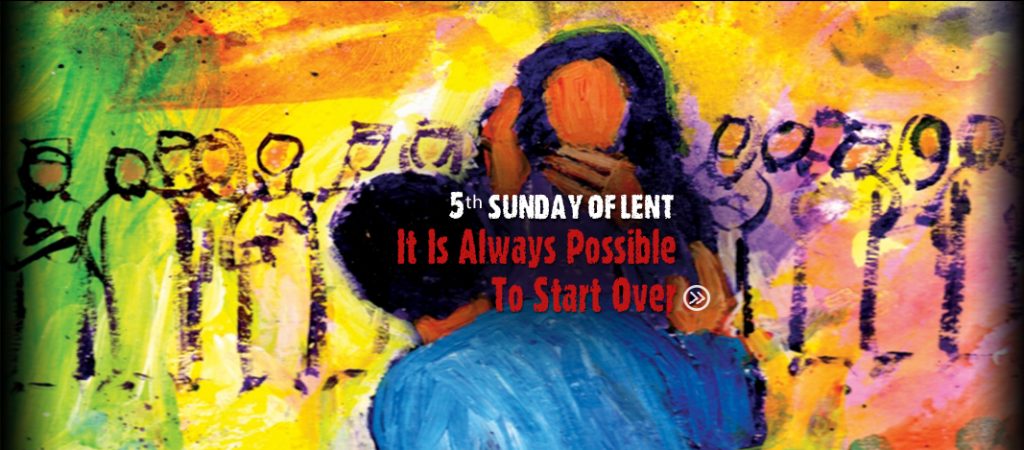Is. 43:16-21; Ps. 126; Phil. 3:8-14; Jn. 8:1-11
It Is Always Possible To Start Over
We are all very familiar with the words of Jesus, taken from the Gospel of this Fifth Sunday of Lent: “Let the one among you who is without sin be the first to throw a stone at her.” In fact, we’ve learned the statement so well that every time we have to justify a mistake we’ve made we are prompt to quote it, using it as a shield to protect ourselves. But in reality, these words spring from the heart of Jesus, who is ready to defend a woman caught in the act of adultery because she–like every person–has a dignity that does not depend on behavior: a person should not be identified with his/her sins.
I have tried many times to grasp the story of this woman. She is a person like many others, looking for true love–a love that takes care of the beloved; a love that speaks of caresses and tenderness.
Jesus lowers his gaze and writes on the ground. He seems to be looking for a distraction that does not involve him emotionally. At least, so it would seem. Instead, he shows tenderness and a respectful reverence for the woman. Yes, for her! He helps us understand that my story, your story, our story is also included in that story of adultery. Jesus does not justify adultery, but he takes care of the adulteress.
While everyone else in the crowd sees a sinner, Jesus sees a life that can bloom once again. While everyone else is looking around for stones to end the woman’s life, the Master transforms those stones into a new road she can follow so as to attain a life of grace, truth, beauty and love.
One thing is sure: this page of the Gospel helps us understand the heart of God: a heart that bends over the fragile and trampled dignity of humanity; a heart that cannot help but offer compassion and that urges us to continually rise again; a heart that does not condemn but that re-opens the path: “Go!” Because we must always start afresh and live according to new possibilities. Jesus tells us that we are not identified with our mistakes or sins. He always sees in us the positive future we are capable of constructing.
Psalm 126
When the Lord restored the fortunes of Zion,
we were like those who dream.
Then our mouth was filled with laughter,
and our tongue with shouts of joy.
Then it was said among the nations,
“The Lord has done great things for them.”
The Lord has done great things for us,
and we rejoice.

